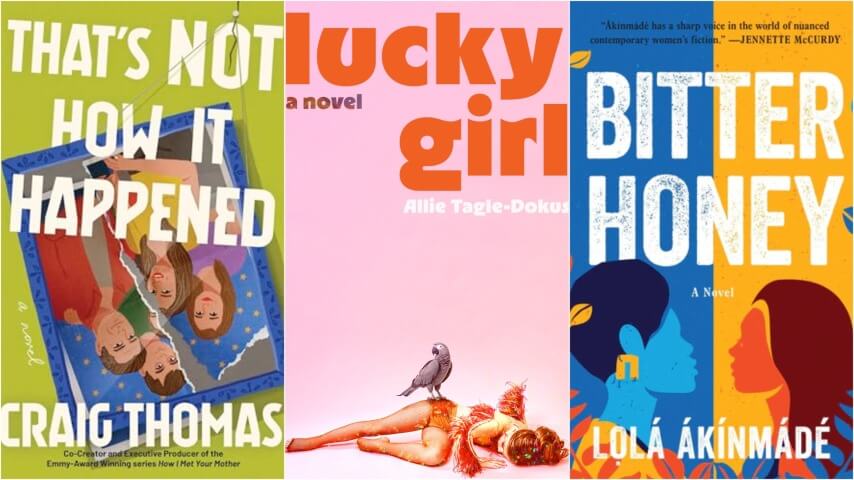Similarly, fame also compounds family conflict in Bitter Honey by Lola Akinmade Åkerström (November 4). Tina is on the cusp of superstardom as a young biracial pop star when a paternity scandal shakes the foundations of her life and career. Ordinary coming-of-age concerns like identity and belonging are heightened in the public eye, where her face is splashed in the newspapers next to that of her estranged father, a white man who is also a famous artist. In Bitter Honey, Tina’s fame runs parallel to her mother Nancy’s experience moving from Gambia to Sweden as a student. Like Nancy, Tina travels to foreign lands that make her feel ostracized, exoticized. Of course, fame can’t heal the wounds left by generational trauma; it only intensifies them, and deepens the divide between the two women.
That’s also true of Lucy and her mom in Lucky Girl by Allie Tagle-Dokus (November 11). Lucy is a young dancer who shoots to stardom as the muse of a pop star (à la Maddie Ziegler and Sia). In doing so, she surpasses her own mother’s wildest dreams of a performance career and leaves her entire family far behind for an alien existence in Hollywood. For Lucy, the glare of the spotlight complicates her relationship to her body and ambitions, to her family and friends, to men and sexuality. Notoriety, like adolescence, is isolating and dramatic. It strains Lucy’s mental health and distorts her self image, amplifying the typical growing pains that come with coming of age. The average reader may never experience the extreme scenarios endured by Lucy, Tina, or the McConnell family, but most of us can relate to the deeply human concerns underlying the facade of fame. Check out more of our November reads below, and be sure to share what you’re reading this month in the comments. [Mary Kate Carr]
Palaver by Bryan Washington (November 4)
The prose of Palaver is spare, leaving plenty of gaps to fill in over its 319 pages. Bryan Washington’s second novel concerns a mother—an immigrant from Jamaica now living in Houston—as she drops in on her semi-estranged son living in Tokyo. The son’s life across the Pacific is vivid, and as it comes into focus for the mother, so does her past in the Caribbean and what made her leave come into focus for the reader. Ahead of the book’s release, Washington described his desire to work more with third-person narration and the distance and uncertainty it creates. Uncertainty abounds in Palaver, which is emotional but not cloying, avoiding melodramatic catharsis for smaller, more honest moments of missed connection and minor revelation. The more the son and the mother learn about each other, the more they realize they don’t know. And though this is a rather understated character study, I absolutely tore through my copy. [Drew Gillis]
Flat Earth by Anika Jade Levy (November 4)
Flat Earth is very specifically situated in the years between lockdown and the second Trump presidency, with its characters in grad school shifting out of a prolonged adolescence. As its title suggests, it’s a time rife with conspiracy theories on levels both societal and personal. The text begins with poetic descriptions of an Adderall shortage, and the plot focuses on Avery, our narrator, and her best friend Frances, who drops out of grad school for a traditional wedding in the rural South. Frances is privileged and seemingly naturally talented; Avery less so, on both counts. Avery takes a job with a right-wing dating app called Patriarchy, and spirals upon Frances’ return to New York. I read about 20 percent of Flat Earth before contributing this blurb, and while some of it undeniably resonates because I lived in New York during the time period depicted, Levy’s work also has a strong sense of dark, ironic humor that recalls midcentury literature. [DG]
The Outsider: A Memoir For Misfits by Vir Das (November 4)
Vir Das, a prominent name in the Indian comedy space, has successfully started to establish a base in the U.S.: He starred in Judd Apatow’s The Bubble, ABC’s gone-too-soon Whiskey Cavalier, and hosted last year’s International Emmys). One of the reasons his humor transcends boundaries is his multicultural experiences, having grown up in India and Nigeria, as well as worked in Chicago as an up-and-comer trying to break into the industry there. In his debut memoir, which arrives on the heels of launching his Lincoln Center residency in New York City, he poignantly writes about exploring his identity through the lens of always feeling like The Outsider (even in his own home country), and how that shaped his career in Bollywood and now Hollywood. [Saloni Gajjar]









































